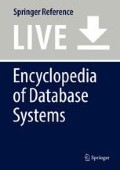Recommended Reading
Adam NR, Wortmann JC. Security-control methods for statistical databases: a comparative study. ACM Comput Surv. 1989;21(4):515–56.
Agrawal R, Srikant R. 2000.Privacy preserving data mining. In: Proceedings of the ACM SIGMOD international conference on management of data.p. 439–50.
Agrawal S, Haritsa JR. A framework for high-accuracy privacy-preserving mining. In: Proceedings of the 21st international conference on data engineering. 2005. p. 193-204.
Barak B, Chaudhuri K, Dwork C, Kale S, McSherry F, Talwar K. Privacy, accuracy and consistency too: a holistic solution to contingency table release. In: Proceedings of the 26th ACM SIGACT-SIGMOD-SIGART symposium on principles of database systems. 2007.
Blum A, Dwork C, McSherry F, Nissim K. Practical privacy: the SuLQ framework. In: Proceedings of the 24th ACM SIGACT-SIGMOD-SIGART symposium on principles of database systems. 2005. p. 128–38.
Dwork C, McSherry F, Nissim K, Smith A. Calibrating noise to sensitivity in private data analysis. In: Proceedings of the 3rd theory of cryptography conference. 2006. p. 265–84.
Evfimievski A, Gehrke J, Srikant R. Limiting privacy breaches in privacy preserving data mining. In: Proceedings of the 22nd ACM SIGACT-SIGMOD-SIGART symposium on principles of database systems. 2003. p. 211–22.
Evfimievsky A, Srikant R, Gehrke J, Agrawal R. Privacy preserving data mining of association rules. In: Proceedings of the 8th ACM SIGKDD international conference on knowledge discovery and data mining. 2002. p. 217–28.
Huang Z, Du W, Chen B. Deriving private information from randomized data. In: Proceedings of the 23th ACM SIGMOD conference on management of data. 2004.
Kargupta H, Datta S, Wang Q, Sivakumar K. On the privacy preserving properties of random data perturbation techniques. In: Proceedings of the 2003 IEEE international conference on data mining. 2003. p. 99–106.
Kifer D, Gehrke J. Injecting utility into anonymized datasets. In: Proceedings of the ACM SIGMOD international conference on management of data. 2006.
Machanavajjhala A, Kifer D, Abowd J, Gehrke J, Vihuber L. Privacy: from theory to practice on the map. In: Proceedings of the 24th international conference on data engineering. 2008.
On The Map (Version 2) http://lehdmap2.dsd.census.gov/.
Rastogi V, Suciu D, Hong S. The boundary between privacy and utility in data publishing. Tech. rep., University of Washington; 2007.
Reiter J. Estimating risks of identification disclosure for microdata. J Am Stat Assoc. 2005;100:1103–13.
Rubin DB. Discussion statistical disclosure limitation. J Off Stat. 1993;9(2):461–8.
Warner SL. Randomized response: a survey technique for eliminating evasive answer bias. J Am Stat Assoc. 1965;60(309):63–9.
Author information
Authors and Affiliations
Corresponding author
Editor information
Editors and Affiliations
Section Editor information
Rights and permissions
Copyright information
© 2016 Springer Science+Business Media LLC
About this entry
Cite this entry
Machanavajjhala, A., Gehrke, J. (2016). Randomization Methods to Ensure Data Privacy. In: Liu, L., Özsu, M. (eds) Encyclopedia of Database Systems. Springer, New York, NY. https://doi.org/10.1007/978-1-4899-7993-3_301-2
Download citation
DOI: https://doi.org/10.1007/978-1-4899-7993-3_301-2
Received:
Accepted:
Published:
Publisher Name: Springer, New York, NY
Online ISBN: 978-1-4899-7993-3
eBook Packages: Springer Reference Computer SciencesReference Module Computer Science and Engineering

